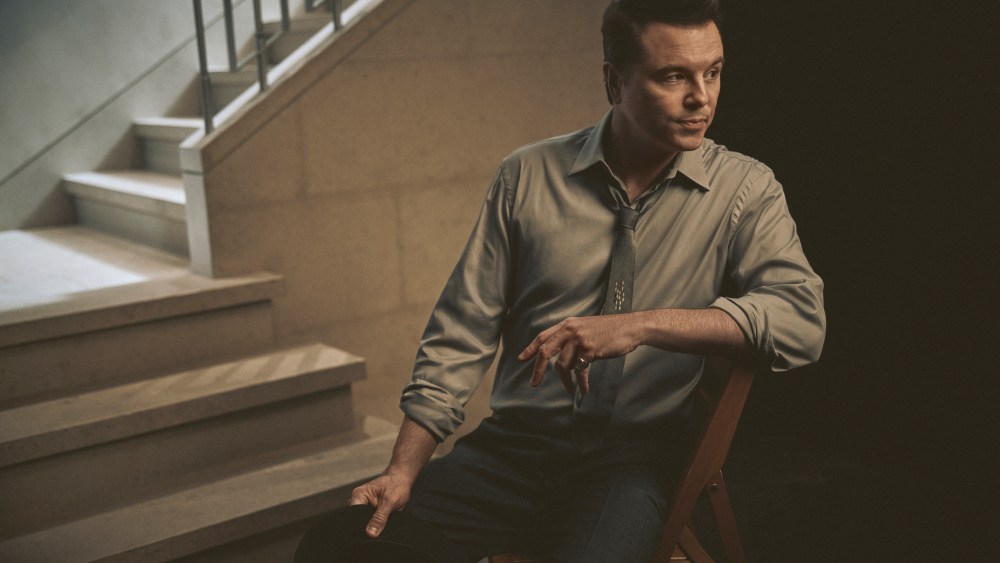Frank Sinatra wasn’t just a great singer. He was very specific about the arrangements of the material he chose to sing, and some of the finest arrangers of the 20th century — including Nelson Riddle, Billy May, Quincy Jones, Johnny Mandel, Robert Farnon and Neal Hefti — wrote for the legendary Chairman of the Board.
Actor-producer-singer Seth MacFarlane has inherited the Sinatra library of musical material, and has made an astounding discovery: dozens of arrangements of songs that Sinatra had planned to perform but never did. And the result is a new MacFarlane vocal album, due out June 6, that features 12 of those previously unrecorded charts.
“Lush Life: The Lost Sinatra Arrangements” (on Verve / Republic) was recorded at Skywalker Sound north of San Francisco, with a 70-piece orchestra led by British conductor John Wilson.
MacFarlane tells Variety, “What’s special about what these [arrangers] did, and what’s unique about Sinatra’s role in this is that, with the possible exception of Nat King Cole, there really wasn’t any other vocalist of that era who seemed to understand the importance of an arrangement to the degree that Sinatra did.
“He really had a love for the charts — he understood how they could elevate a vocal,” he continues. “What’s really telling is when you pull the vocal out and you’re just hearing the charts, what you’re hearing is a degree of artistry that is unmatched in popular music before or since. These charts alone, independent of the vocal part, were really high musical art.”
Nine of the songs are Nelson Riddle arrangements; two are by Billy May, and one is by Don Costa. Riddle, widely considered one of the greatest arrangers in American music, was a favorite not only of Sinatra but also Ella Fitzgerald, Nat King Cole, Rosemary Clooney and other top singers of the 1950s and ’60s. Riddle arranged and conducted 13 albums for Sinatra from 1954 to 1966 including “In the Wee Small Hours” and “Only the Lonely.”
May arranged six albums for Ol’ Blue Eyes from 1958 to 1980, including “Come Fly With Me”; he too was a favorite of vocalists including Cole, Peggy Lee, Nancy Wilson and others; Costa arranged nine Sinatra LPs from 1962 to 1980, including “Sinatra and Strings” and “My Way,” and did the same for other singers including Paul Anka, Steve Lawrence and Eydie Gorme.
Some of these were written for Sinatra albums that would turn out to be classics. The regret-filled “How Did She Look?,” arranged by Riddle, was intended for “Only the Lonely,” Sinatra’s famous collection of saloon songs, while the swinging “Flying Down to Rio,” arranged by May, didn’t quite make the cut for Sinatra’s “Come Fly With Me” album.
Several tracks on MacFarlane’s album are familiar songs, but in previously unrecorded arrangements like “Give Me the Simple Life” (Riddle), “On a Wonderful Day Like Today” (May) and the colorful “Arrivederci, Roma” (Costa) for which MacFarlane provided new lyrics. He also sings the jazz standard “Lush Life” (a particularly sophisticated arrangement by Riddle) and the completely unknown “Shadows” (also Riddle), intended for the 1966 “Moonlight Sinatra” but ultimately rejected.
The Sinatra library, which dates back to the early 1950s, contains 1,875 song arrangements, all in the hand of the original arrangers. After Sinatra’s death in 1998, Frank Sinatra Jr. became its proprietor. “Frank Jr. used to do ‘Family Guy’ periodically,” says MacFarlane (the animated series’ creator-producer), “and became a good friend to the show.
“And when he passed away, stewardship of the library went to [Frank’s daughter] Tina Sinatra. I developed a friendship with her, and she remains a very close friend to this day. And she allowed us to go through the library, which at the time was about 1,200 boxes.”
In a statement to Variety, Tina Sinatra said: “Seth’s interest and knowledge of my father’s music is boundless. With arrangements by the masters, Nelson Riddle, Billy May and Don Costa, we can only wonder why these songs went un-produced. Thanks to Seth, we can now enjoy these lost Sinatra arrangements.”
Producer Joel McNeely (who is also a composer on MacFarlane’s “American Dad” and “The Orville”) says of those 1,800 arrangements, about 100 had never before been played. “That made us very curious,” he reported. “So Seth asked me to put together an orchestra, and we just started reading through them, one after another.
“I think we went through 60 of 70 of them. We were looking for the gold from that era of the ’50s and ’60s. It was a process of discovery. They just sat in a drawer for 60 years, black dots on white paper.
“So we got out ‘Give Me the Simple Life,’ and it starts off with those signature Nelson Riddle flutes. I’m looking at his original pencil dots and thinking, through this paper, through time, there is Nelson Riddle’s voice, his signature, long after he’s dead.
“I know it sounds trite, but when you spend your life putting black dots on white paper, to resurrect somebody else’s dots that they never actually got to hear was super special,” he concludes. “We were all just pinching ourselves.”
Read the full article here


